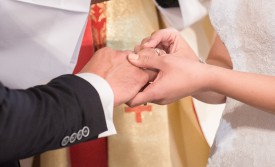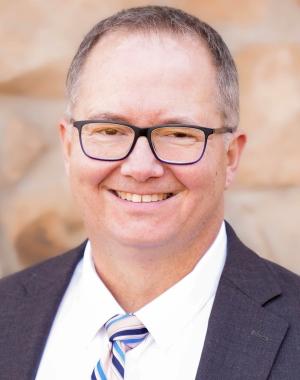 We need to find the right language, arguments and forms of witness that can help us reach the hearts of young people,appealing to their capacity for generosity, commitment, love and even heroism, and in this way inviting them to take up the challenge of marriage with enthusiasm and courage. (Pope Francis, Amoris Laetitia, art. 40) God is present in the ordinary humanity of family life: in the crises and in the joys. As catechists, we have the privilege of helpingpeoplebecome more attuned and responsive to this God who is present through matrimonial grace. What difference could such responsiveness make to a typical family? To answer, we turn to one of our greatest saints. “Why doubt, if we have faith, that miracles will be worked while he is within us and that he will give what we ask of him, since he is in our house? His majesty is not accustomed to paying poorly for his lodging if the hospitality is good.”[i] So wrote St. Teresa of Avila, describing what becomes possible when we welcome the gift God makes of himself in the Eucharist. It might surprise many today that these same words could be similarly applied within the context of the Sacrament of Marriage. This sacrament is another continuing encounter with sheer divine gift, where God enters uniquely into the love between husband and wife. The Catechism describes well what is new in their love through this sacrament: “Christ dwells with them, gives them the strength to take up their crosses and so follow him…and to love one another with supernatural, tender and fruitful love.”[ii] By welcoming Love Incarnate into married love and learning to draw upon his Presence, miracles become possible not just within the marriage but also in and through the family. Natural human love, beautiful (yet limited) as it is, gradually becomes purified, divinized, and elevated into a profound consistency with the self-giving we see in Christ offering all from the Cross. Welcoming God into human love has this marvelous effect: all can be made new! In Amoris Laetitia, Pope Francis challenges us: “We should not be trapped into wasting our energy in doleful laments, but rather seek new forms of missionary creativity.”[iii] Cardinal Marc Ouellet wrote an important book that suggests a vision of marriage preparation that rises to the challenge of Pope Francis. He writes:
We need to find the right language, arguments and forms of witness that can help us reach the hearts of young people,appealing to their capacity for generosity, commitment, love and even heroism, and in this way inviting them to take up the challenge of marriage with enthusiasm and courage. (Pope Francis, Amoris Laetitia, art. 40) God is present in the ordinary humanity of family life: in the crises and in the joys. As catechists, we have the privilege of helpingpeoplebecome more attuned and responsive to this God who is present through matrimonial grace. What difference could such responsiveness make to a typical family? To answer, we turn to one of our greatest saints. “Why doubt, if we have faith, that miracles will be worked while he is within us and that he will give what we ask of him, since he is in our house? His majesty is not accustomed to paying poorly for his lodging if the hospitality is good.”[i] So wrote St. Teresa of Avila, describing what becomes possible when we welcome the gift God makes of himself in the Eucharist. It might surprise many today that these same words could be similarly applied within the context of the Sacrament of Marriage. This sacrament is another continuing encounter with sheer divine gift, where God enters uniquely into the love between husband and wife. The Catechism describes well what is new in their love through this sacrament: “Christ dwells with them, gives them the strength to take up their crosses and so follow him…and to love one another with supernatural, tender and fruitful love.”[ii] By welcoming Love Incarnate into married love and learning to draw upon his Presence, miracles become possible not just within the marriage but also in and through the family. Natural human love, beautiful (yet limited) as it is, gradually becomes purified, divinized, and elevated into a profound consistency with the self-giving we see in Christ offering all from the Cross. Welcoming God into human love has this marvelous effect: all can be made new! In Amoris Laetitia, Pope Francis challenges us: “We should not be trapped into wasting our energy in doleful laments, but rather seek new forms of missionary creativity.”[iii] Cardinal Marc Ouellet wrote an important book that suggests a vision of marriage preparation that rises to the challenge of Pope Francis. He writes:
It would be helpful if those preparing couples for the sacrament would directly proclaim the anthropological and sacramental meaning of marriage, calling the individuals to faith and showing them the value and implications of the sacrament…Those who request the sacrament should receive a positive welcome and should be confronted with the exciting and demanding mystery of Christian marriage. This would give them the chance to choose, that is, either to commit themselves or, supposing a real resistance to faith on their part, to seek an alternative. For this purpose, a pre-matrimonial catechumenate could certainly be useful, even if it is not a comprehensive or fully satisfying solution.[iv]
In such an approach, preparation for marriage and family life conveys the important truth regarding man and woman in marriage as well as the life-giving reality of God’s sacramental presence. An invitation to freely choose and commit to authentic Christian marriage is extended, with the freedom to seek other alternatives if Christian marriage isn’t really what is wanted. Finally, a substantive period of preparation is made available, a formation modeled upon the ancient catechumenate. Additionally, couples today need the option to be supported after the marriage rite, particularly during the all-important “neophyte year” of marriage. Pope Francis encourages a specific pastoral accompaniment beyond the celebration of the sacrament.[v] Taking Cardinal Ouellet’s insight as our starting point, a marriage catechumenate could be followed by a mystagogy for matrimony. As was the practice in the very early centuries of Christianity with the newly baptized, a mystagogical, reflective period could focus on the objective effects of the sacrament and on the implications of this gift for our marriage and family. Particularly important to this process would be the inclusion of the testimony and the guidance of married couples who have experience drawing upon the presence and power of Christ in their marriage. Whatever the specific details a particular parish or diocese settles upon, a discipleship process for those seeking Christian marriage is vital to cultivating the “joy of love” in marriages and families today. Dr. James Pauley is Associate Professor of Theology and Catechetics at Franciscan University of Steubenville. He is grateful for his parents, John and Kathleen Pauley, who celebrate their fiftieth year of marriage this month.
Notes
This article is from The Catechetical Review (Online Edition ISSN 2379-6324) and may be copied for catechetical purposes only. It may not be reprinted in another published work without the permission of The Catechetical Review by contacting [email protected]


















